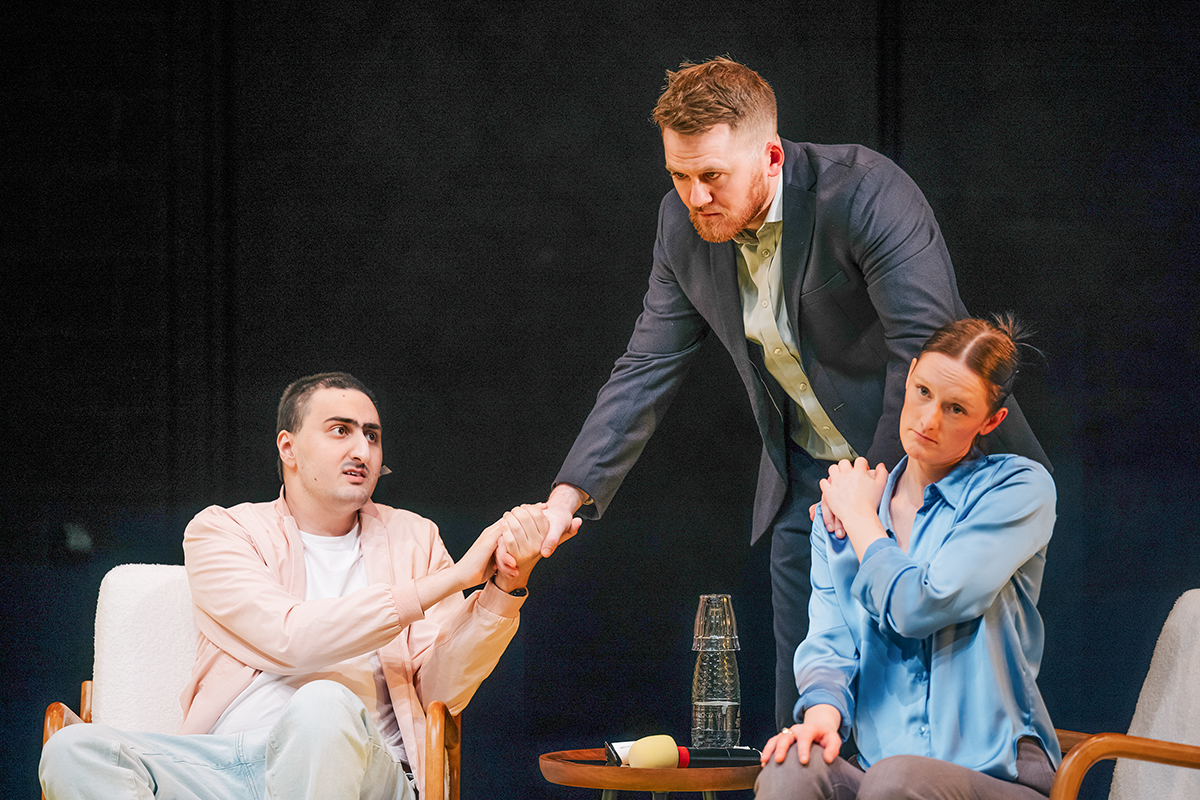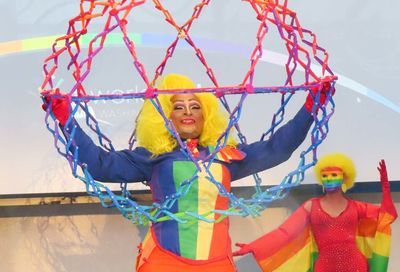‘seven methods of killing kylie jenner’ Review: Twitter Tirade
The fierce performances are nearly drowned out by theatrical noise in Woolly's 'seven methods of killing kylie jenner.'

Somebody in seven methods of killing kylie jenner (★★★☆☆) holds serious grievances against the “self-made” billionaire baby mogul of the Kardashian-Jenner clan. It might be playwright Jasmine Lee-Jones, who voices myriad beefs through Cleo (Leanne Henlon), the brassy, riled-up Black British teenager who sparks a social media uproar in the audacious comedy making its U.S. premiere at Woolly Mammoth.
Cleo’s methods of expressing her indignation online, through memes and shitposts, and a Twitter tirade listing gruesome ways she’d like to make an example of Jenner, certainly look like the m.o. of an internet troll. But she’s no mere green-eyed hater. To Jones’ credit, and that of director Milli Bhatia and her energetic two-person cast, Cleo doesn’t come off as just bitter or genuinely malicious, despite her deranged-sounding manifesto.
Set off by Forbes Magazine‘s declaration that Kylie Jenner had, thanks to her cosmetics and promotional interests, attained the status of the world’s youngest self-made billionaire, Cleo raises worthy questions about how a person born into enormous wealth, fame, and privilege could be considered self-made.
More crucially, she’s pissed off by what she sees as Kylie, Kim, and other white women co-opting and commodifying Black culture, from fashion and image to facial features. So she takes to social media to shout her piece, posts her seven deadly methods, each more grisly than the last, and incurs the wrath of seemingly the world. The one person left standing in her corner is best friend Kara (Tia Bannon), who, it turns out, has grievances of her own that hit closer to home.

If Cleo’s righteous outrage propels seven methods, it’s Kara’s calm that provides a necessary counterbalance, so the rage doesn’t boil over, and we can absorb the discussion — for instance, when they dispute whether bi-racial Kara benefits from colorism. Henlon and Bannon, both of whom performed in Bhatia’s staging of seven methods at Royal Court Theatre in London before joining this U.S. tour, enact a loving, complicated friendship that helps soften Cleo’s razor-sharp edges.
The pain behind Cleo’s ill-advised internet crusade comes to light in how she pours her heart out to Kara. They both have pain. Kara recalls that Cleo wasn’t the queer ally Kara needed when she first came out. And Cleo might, in fact, be harboring some bitterness about a recent breakup with a boy. They’re both just kids, which makes the intensity of Cleo’s anger something to witness.
Jones conjures harrowing imagery in Cleo’s speeches, as in her description of #DeathByDrowning, wanting her victim to be swallowed by the ocean like so many enslaved Africans were during the Middle Passage. Onstage, Bhatia and crew work to match that imagery with ostentatious visual elements, like the tree spun of yarn and rope that dominates Rajha Shakiry’s set.
Lit from within and around by Jessica Hung Han Yun, the tree alternately resembles a web of neurons in the brain, or a willow weighed down with bodies strung from its branches. It also suggests the internet cloud of digital noise and data looming dangerously over Cleo.

The best friends frequently break from their passionate, plot-driven debates for loose beats of text-speak and meme quotes, interstitial lightning rounds of wordplay that mimic scroll-surfing across social media. Henlon and Bannon don’t just recite the words but embellish them with shouts and movements and directorial flourishes that, like the tree, might be meant to evoke an atmosphere of modern culture, but really just hang there adding more chaos than meaning.
Those beats are repetitive, too, thick with acronyms and abbreviated lingo that sound like people picking buzzwords out of a hat. A selected glossary of internet lingo and Black British slang is provided with the playbill, but, ultimately, the “freestyle” scenes don’t complement but, rather, compete with the story Jones is telling.
In a quiet moment near the end, Cleo says more in a short prayer to Saartjie Baartman, the 18th-century African woman who was sold to be exhibited as the “Hottentot Venus,” than in a half dozen rowdy sound-offs on the power of memes.
seven methods of killing kylie jenner runs through Feb. 26 at Woolly Mammoth, 641 D St. NW. Tickets are $29 to $76, with a limited number of pay-what-you-wish tickets available for each performance. Visit www.woollymammoth.net.
Support Metro Weekly’s Journalism
These are challenging times for news organizations. And yet it’s crucial we stay active and provide vital resources and information to both our local readers and the world. So won’t you please take a moment and consider supporting Metro Weekly with a membership? For as little as $5 a month, you can help ensure Metro Weekly magazine and MetroWeekly.com remain free, viable resources as we provide the best, most diverse, culturally-resonant LGBTQ coverage in both the D.C. region and around the world. Memberships come with exclusive perks and discounts, your own personal digital delivery of each week’s magazine (and an archive), access to our Member's Lounge when it launches this fall, and exclusive members-only items like Metro Weekly Membership Mugs and Tote Bags! Check out all our membership levels here and please join us today!






















You must be logged in to post a comment.